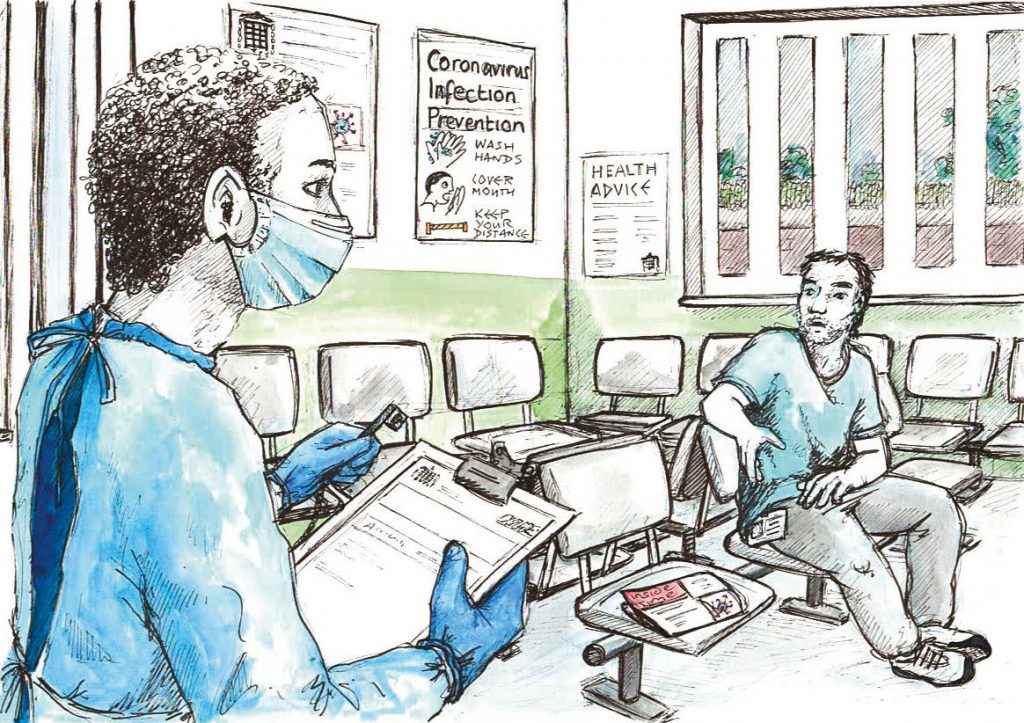Prisoners’ mental health suffering under conditions of “prolonged solitary confinement”
People in prison have revealed the devastating impact of Covid-19 restrictions on their mental health and wellbeing, in a briefing launched today by the Prison Reform Trust which examines the issue of prisoners’ health during the pandemic.
Based on evidence received from prisoners and their families from June to the present day, the briefing highlights the consequences for prisoners of being locked in their cells for up to 23 hours a day for the past 10 months under conditions which amount to “prolonged solitary confinement”.
It also highlights measures taken by prisons which had made the situation more bearable. These include kindness and empathy from staff, access to exercise and other activities, mental health support, good communications and effective precautions against the disease.

The briefing is published on the same day as the release of an HM Inspectorate of Prisons thematic review on the impact of the pandemic on prisoners, which reveals the heavy toll restrictions have taken on prisoners’ wellbeing and rehabilitation.
CAPPTIVE is a collaborative project by the Prison Reform Trust and our Prisoner Policy Network, which aims to describe life in prison under the pandemic.
The first CAPPTIVE briefing covered families and communication and the second, regimes, reactions and progression. This, the third briefing, covers precautions against transmission, routine health care, disabilities, prisoners’ well-being, mental health, self-harm, and what helped. CAPPTIVE received 180 responses from prisoners related to health, drawn from 79 identified prisons and six unspecified prisons.
In March 2020, HM Prison and Probation Service introduced measures to protect prisoners and staff in light of Covid-19. This included the introduction of a quarantine regime, ceasing all inter-prison transfers, separating new arrivals, isolating symptomatic prisoners, and shielding vulnerable prisoners.
Under the quarantine regime, time out of cell was severely restricted, leaving the vast majority of the prison population locked in their cells for up to 23 hours a day. The United Nations defines solitary confinement as being held in a cell for 22 hours or more per day. It states that prolonged solitary confinement is cruel, inhuman, or degrading. Prolonged is anything over 15 days.
The vast majority of CAPPTIVE respondents who wrote about the quarantine regime described negative effects for their well-being. Out of 180 prisoner responses on the theme of health, only three (less than 2%) mentioned any personal benefit from the regime of 23 hours isolated in their cell.
People experienced sensory deprivation due to 23-hour confinement in a cell, and many respondents reported feeling fatalistic. CAPPTIVE evidence showed that the regime undermined a person’s sense of identity; took away self-worth; and led to anxieties about the effects of separation on children.
“Mental health—the impacts on residents like myself can be profound, unexpected and confusing to all. This is a particular concern for me as the invisible harm is harder to address than the visible.”
CAPPTIVE contributor
Another said:
“Individuals suffering from mental health conditions such as claustrophobia, PTSD, anxiety and depression…would be up all night doing overtime thinking or panicking or stressing and then be faced with that hectic ‘first thing in the morning’ regime. I observed a few not clean their cells or have showers for weeks due to this.”
Prison rehabilitation promotes positive change through education, skills training, offending behaviour programmes, faith activities, and volunteering roles. Activities help to motivate people to get through their sentence and give that time a purpose. The quarantine regime curtailed most of these opportunities and led many to question whether their lives had a purpose.
One prisoner said:
“Mental health is a massive issue here in prisons and…we are simply given a colouring pack. Depression, anxiety, discomfort, boredom and comfort eating, the ladies are piling the weight on. I feel I’m in the passenger seat of an out of control car and we are about to hit a brick wall.”
The lack of activities and the loss of family contact undermined people’s well-being and contributed to depression. A few responses to CAPPTIVE provided strong evidence that staff were sometimes unaware of the damage that the quarantine regime was doing to mental health.
Prisoners writing to CAPPTIVE stressed the importance of kindness and empathy to help them cope. The quality of staff engagement with prisoners is vital to prisoners’ well-being – taking an interest in the needs of each person as an individual, giving people time to talk through the effects of the quarantine regime, and helping people fill their time meaningfully.
One prisoner said:
“Since the lockdown it has been an abundance of solitary confinement, but a lot of the staff members have managed to show empathy towards myself and other inmates’ situations and concerns to the best of their ability. Taking the time to talk to inmates after stressful phone calls, encouraging distraction techniques, as well as encouraging keeping a high hygiene standard.”
The findings of the briefing suggest that the prison service is facing fundamental questions about how to manage the risks posed by Covid-19 and “build back better”. The service understands that achieving a “healthy” prison means much more than freedom from disease. The messages contained in this report from people who live in prison is that they should be part of the blueprint for a healthier future.
Commenting, Peter Dawson, director of the Prison Reform Trust, said:
“Just as it has in the community, the situation in our overcrowded prison system has got worse since the evidence in this report was gathered. The suffering and long-term harm it describes are deeper than ever. But the report also shows the building blocks for a better future. Empathy and kindness from many staff have made a real difference, and it will be full active days spent out of the confines of a nine foot by six foot cell that define recovery in the longer term.”